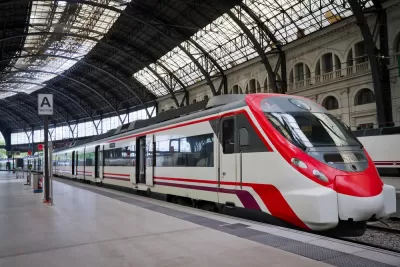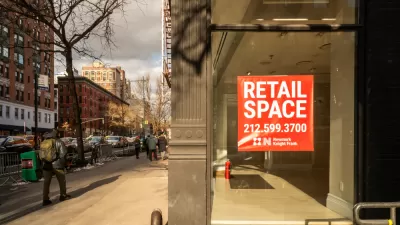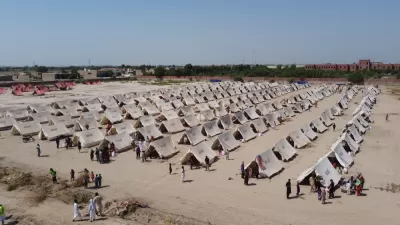A new United Nations Secretary-General's High-level Advisory Group on Sustainable Transport identifies policies that can result in inclusive and equitable growth, social development, protection of the global environment and ecosystems.

The High-level Advisory Group on Sustainable Transport works with governments, transport providers (aviation, marine, ferry, rail, road, and urban public transport), businesses, financial institutions, civil society and other stakeholders to promote sustainable transport systems and their integration into development policies. Their report, "Mobilizing Sustainable Transport for Development: Analysis and Policy Recommendations from the United Nations Secretary-General's High-Level Advisory Group on Sustainable Transport" includes numerous examples and case studies from around the world, and identifies specific strategies to create more inclusive and equitable growth, social development, protection of the global environment and ecosystems, and addressing climate change.
It states, "Sustainable transport is a driver of sustainable development and a means by which people can access what they need to live full and fulfilled lives. All actors— governments, business, civil society, and individuals— must make a genuine commitment to transforming the transport system in terms of individual travel and freight into one that is safe, affordable, accessible, efficient, and resilient, while minimizing carbon and other emissions and environmental impacts."
The group submitted the following ten recommendations:
- Make transport planning, policy and investment decisions based on the three sustainable development dimensions—social development, environmental (including climate) impacts and economic growth—and a full life cycle analysis.
- Integrate all sustainable transport planning efforts with an appropriately-balanced development of transport modes: integration vertically among levels of government and horizontally across modes, territories and sectors.
- Create supportive institutional, legal and regulatory government frameworks to promote effective sustainable transport.
- Build technical capacity of transport planners and implementers, especially in developing countries, through partnerships with international organizations, multilateral development banks, and governments at all levels, to ensure equitable access to markets, jobs, education and other necessities.
- Reinforce efforts toward preventing road traffic deaths and injuries.
- Foster an informed, engaged public as a crucial partner in advancing sustainable transport solutions.
- Establish monitoring and evaluation frameworks for sustainable transport, and build capacity for gathering and analyzing sound and reliable data and statistics.
- Promote diversified funding sources and coherent fiscal frameworks to advance sustainable transport systems, initiatives and projects.
- Increase international development funding and climate funding for sustainable transport.
- Promote sustainable transport technologies through outcome-oriented government investment and policies that encourage private sector investment and action through various incentive structures.
FULL STORY: Mobilizing Sustainable Transport for Development

Coming Soon to Ohio: The Largest Agrivoltaic Farm in the US
The ambitious 6,000-acre project will combine an 800-watt solar farm with crop and livestock production.

Pennsylvania Mall Conversion Bill Passes House
If passed, the bill would promote the adaptive reuse of defunct commercial buildings.

U.S. Supreme Court: California's Impact Fees May Violate Takings Clause
A California property owner took El Dorado County to state court after paying a traffic impact fee he felt was exorbitant. He lost in trial court, appellate court, and the California Supreme Court denied review. Then the U.S. Supreme Court acted.

Dallas Surburb Bans New Airbnbs
Plano’s city council banned all new permits for short-term rentals as concerns about their impacts on housing costs grow.

Divvy Introduces E-Bike Charging Docks
New, circular docks let e-bikes charge at stations, eliminating the need for frequent battery swaps.

How Freeway Projects Impact Climate Resilience
In addition to displacement and public health impacts, highway expansions can also make communities less resilient to flooding and other climate-related disasters.
City of Costa Mesa
Licking County
Barrett Planning Group LLC
HUD's Office of Policy Development and Research
Mpact Transit + Community
HUD's Office of Policy Development and Research
Tufts University, Department of Urban and Environmental Policy & Planning
City of Universal City TX
ULI Northwest Arkansas
Urban Design for Planners 1: Software Tools
This six-course series explores essential urban design concepts using open source software and equips planners with the tools they need to participate fully in the urban design process.
Planning for Universal Design
Learn the tools for implementing Universal Design in planning regulations.

























